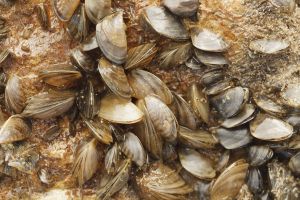Source: Texas Parks and Wildlife Department | Dec. 12, 2019
The Texas Parks and Wildlife Department (TPWD) has added Lake Marble Falls and Granger Lake to the statewide list of lakes infested with invasive zebra mussels after discovering established, reproducing populations in the lakes this fall.

Lower Colorado River Authority (LCRA) biologists confirmed the presence of zebra mussels in Lake Marble Falls after finding settled zebra mussels as well as their larvae at multiple sites in the lake. After Lake Lyndon B. Johnson was found to be infested with zebra mussels in July of this year, it was expected that they would spread downstream to Lake Marble Falls.
TPWD and LCRA are reminding lake users to take the proper steps to avoid spreading this highly invasive species into lakes further upstream in the Colorado River or into other waterbodies.
“We continue to work closely with our partners at Texas Parks and Wildlife to monitor the presence of zebra mussels in the Highland Lakes,” said Bryan Cook, LCRA Manager of Water Quality Protection. “It’s important to do what we can to stop zebra mussels from spreading to new lakes. We encourage boaters to continue to clean, drain and dry their boats and trailers, as well as to drain all water from boats and onboard receptacles when moving from lake to lake.”
Granger Lake, which was designated positive in May after repeated detections of zebra mussel larvae, has now been upgraded to infested after Brazos River Authority staff found adult mussels on settlement samplers placed throughout the lake. Granger Lake is the second lake in the San Gabriel River basin found to be infested; zebra mussels were found in Lake Georgetown in 2017.
“Although it’s saddening every time we find zebra mussels in a new lake or confirm that a lake is fully infested as we have with Marble Falls and Granger, it is still encouraging that zebra mussels have not been moved into any new river basins since 2017,” said Monica McGarrity, TPWD Senior Scientist for Aquatic Invasive Species Management. “Only boats can move zebra mussels upstream or into new river basins. It is important for all lake users to protect our lakes by cleaning, draining and drying their boats and equipment every time they leave the water.”
Boat owners and marina staff should be diligent in ensuring decontamination procedures are followed before moving boats that have been stored in the water on a lake with zebra mussels to another lake.
“Cleaning, draining and drying is not enough to prevent zebra mussels from hitching a ride on a boat or barge that has been stored in the water on a lake with zebra mussels,” McGarrity said. “These vessels pose the highest risk for moving them and causing new infestations because the mussels attach themselves in crevices and other hidden areas, often in large numbers. If you are moving a boat, call TPWD at (512) 389-4848 and we’ll be happy to advise you on the proper procedures to decontaminate your boat and help you through the process.”
As of November 2019, zebra mussels are found in 29 Texas lakes across five river basins. A status map and full list of these lakes can be found on the TPWD website.
The rapidly reproducing zebra mussels can have serious economic, recreational and environmental impacts on Texas reservoirs and rivers. Zebra mussels can harm aquatic species, cover rocks, beaches, hard surfaces with sharp shells, clog water intakes, damage or increase maintenance on facilities using raw surface water, and damage boats stored in lakes with zebra mussels.
TPWD and partners monitor for invasive mussels in Texas lakes, but anyone who finds them in lakes where they haven’t been found before or who spots them on boats, trailers or equipment that is being moved should help prevent new introductions by immediately reporting the sighting to TPWD at (512) 389-4848 or by emailing photos and location information to [email protected].
In Texas, it is unlawful to possess or transport zebra mussels, dead or alive. Boaters are required to drain all water from their boat and onboard receptacles before leaving or approaching a body of fresh water to prevent the transfer of zebra mussels and other invasive species. Zebra mussel larvae are microscopic and can survive for days in residual water, and adult zebra mussels can survive even longer out of water, especially in cooler months. The requirement to drain applies to all types and sizes of boats whether powered or not – personal watercraft, sailboats, kayaks, canoes or any other vessel used on public waters.
More information about zebra mussels can be found online at tpwd.texas.gov/ZebraMussels. A short instructional video on how to properly clean, drain and dry boats and equipment can be found on the TPWD YouTube channel at https://youtu.be/DMlEwbXmLx8.
PO BOX 101988
FORT WORTH, TX 76185
1-800-242-7820
© 2023 Texas & Southwestern Cattle Raisers Association; All Rights Reserved.
